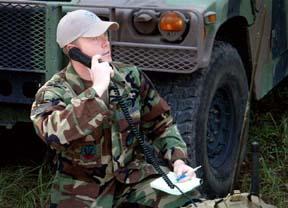A joint tactical air controller with the Louisiana Air National Guard, Air Force Senior Airman Gabe Bird lost everything when Hurricane Katrina struck in 2005 helped his home state respond to Hurricane Ike.
Bird’s home in St. Bernard Parish, southeast of New Orleans, was destroyed when a 25-foot storm surge hammered levees, leaving nearly 15 feet of standing water in most areas and transforming his community into a watery grave. Almost every structure in the area was either damaged or destroyed.
Almost three years to the day after Katrina changed Bird’s life, another storm arrived wreaking havoc on his home state. Hurricane Ike’s center struck the Texas coast, but the storm affected Louisiana as well, as rain in its eastern bands caused major flooding across the state.
After Hurricane Ike made landfall, responders gathered at the Calcasieu Parish sheriff’s office to coordinate their recovery operation plans. With access to the area still cut off from normal routes because of massive flooding, authorities had to postpone any work for a few days.
With phone lines, cellular towers and electricity no longer in service, the Louisiana Air National Guard’s 122nd Air Support Operations Squadron at Camp Beauregard, La., helped local authorities to communicate where there was no other way.
Bird said he knows the importance of getting critical communication to the right people because as a joint tactical air controller in combat, his ability to conduct his mission in a chaotic environment can mean life or death for people relying on him.
“We request, coordinate, and control air strikes for ground forces, whether it’s Army, Marines, or Special Forces,” he said. “JTAC is what the Army knows us by.”
From forward positions, JTACs communicate with aircrews flying close-air-support missions and tell them where to bomb the enemy. JTACs spend most of their career assigned to Army units, most often embedded with special operations forces.
Bird returned in June from a deployment to Afghanistan, where he worked with the Army’s 173rd Airborne Brigade.
“We controlled 120 air strikes in the four and a half months we were there,” he said. “We brought a lot of bad days to the bad guys.”
Back in Louisiana, his mission was to use the skills he used to attack Taliban forces in Afghanistan to help with the Hurricane Ike recovery efforts.
“We’re going to provide real-time communications through our tactical satellite radios back to the [emergency operations center] element,” Bird explained. The emergency operations centers coordinate relief efforts throughout the state.
“With all communications down in Cameron, the only way to communicate is through a satellite radio, which we provide,” he said.
In Cameron, responders normally would communicate on handheld radios, with the tower serving as a repeater link.
“Since all the towers are down, the cell phones are down; they can’t talk. That’s where we come in,” Bird said. “We’ll provide the tactical satellite communications; when we go forward with the assessment team, we’ll report the damage back to the EOC.”
It may seem hard to go from a combat role to a humanitarian role, but Bird said it’s not that difficult.
“You still have to think outside the box, because we do a lot of things that may not be in our specific job details,” he said. “Our stress level in combat prepares us to deal with this a lot easier.
“It’s probably more stressful for people whose homes got destroyed,” he added.
Having lost his home to Hurricane Katrina, Bird said, he knows exactly what the people he’s helping are going through, and that any little assistance he can provide can go a long way toward getting people back on their feet.
“You can relate to it because you’ve seen it before; you’ve been through it,” he said. “You kind of know how they feel. It hits home a little more, and you can relate to the people a little better.”






















